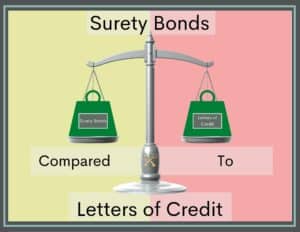

Mortgage Broker Bonds are required to broker or originate mortgages in all 50 states. Learn how to easily obtain these bonds, what they cost and what they guarantee.
Mortgage Broker Bonds protect those applying for mortgages by ensuring that mortgage brokers and mortgage originators comply with laws, rules and regulations of the industry. Should the mortgage broker or originator not follow the laws, a claim can be made against the Mortgage Broker Bond.
Although laws vary by state, most codes require a mortgage broker or originator to be licensed, to disclose fees, and interest, hold deposits in trust, and act in an ethical manner. Most codes also require that the mortgage broker or originator be licensed in all the jurisdictions where mortgages are being originated.
Let's consider an example. Imagine you are looking to purchase your dream home and decide to work with a mortgage broker who presents himself as trustworthy and knowledgeable. However, unbeknownst to you, this broker is engaging in deceptive lending practices, manipulating interest rates and fees to exploit borrowers like yourself. In such a situation, if the mortgage broker has the required bond in place, you have a means to seek compensation for any financial damages caused by their fraudulent behavior.
While often used interchangeably, lenders, originators, and servicers each play a distinct role in the mortgage industry.
OriginatorsLenders are financial institutions or individuals that provide funds for mortgages. They are responsible for approving loan applications and disbursing funds to borrowers. Lenders typically have their own bonding requirements to protect their institution and ensure compliance with industry regulations.
Originators act as intermediaries between borrowers and lenders. They facilitate the loan application process by helping borrowers' complete paperwork, gathering necessary documentation, and submitting the application on their behalf. Originators may work independently or within a brokerage firm.
Imagine you're seeking a mortgage loan and decide to work with a mortgage broker. The broker collaborates with various lenders to find the best loan options that suit your financial needs. In this case, the broker acts as an originator in assisting you throughout the loan application process.
Servicers are responsible for managing mortgage loans once they are originated. This includes collecting payments from borrowers, handling escrow accounts, sending monthly statements, and managing any customer inquiries related to the loan servicing.
Let's say you successfully obtained a mortgage through a lender or broker. It is now the servicer's responsibility to handle payment processing, manage your escrow account for taxes and insurance, and ensure smooth communication between you and the lender.
Understanding these distinctions is important because each entity may have its own bonding requirements based on state regulations. By obtaining the appropriate bonds specific to their roles, lenders, originators, and servicers can contribute to fostering trust and maintaining ethical practices within the mortgage industry.
Now that we've explored how different entities within the mortgage industry have distinct bonding requirements, let's dive into the process of obtaining a mortgage broker bond and the associated costs.
Mortgage Bonds in most states are easily issued. Most can be purchased online and issued instantly with just a credit check. However, larger mortgage brokers, lenders and originators may qualify for significantly better pricing by providing company financial statements once a year. The stronger the financial statements and experience, the better the rates. This is also advantageous by not having to complete multiple applications and will reduce paperwork when operating in multiple states.
Purchase Mortgage Broker, Lender, Servicer, or Originator Bonds Instantly.The National Multistate Licensing System and Registry (NMLS) is the system of record for non-depository financial institution licensing or registration for given states. The agency is the system of record for mortgage broker licensing in the U.S. Many mortgage brokers, services, originators, bankers and other must use the NMLS Electronic Bond System (ESB) to submit and renew their surety bonds for their state. In such states, the mortgage broker surety bond must be filed electronically.
 This shows how mortgage broker bonds work between the broker, state and surety. The background is a cartoon of homes and a neighborhood." width="" />
This shows how mortgage broker bonds work between the broker, state and surety. The background is a cartoon of homes and a neighborhood." width="" />
The mortgage broker is referred to as the principal on the bond. The principal guarantees to perform according to the laws of their state license and act in an ethical manner. The state requiring the bond is referred to as the obligee. The obligee is receiving the guarantee of the mortgage broker bond on behalf of the public. The surety is the bond company that is providing a financial guarantee of the principal's compliance. The principal pays the surety a bond premium and agrees to indemnify the surety in order to get the bond.
A party harmed by the principal's action may file a claim against the bond. The surety will investigate the claim, and pay the claim, if valid. The surety may then seek reimbursement from the mortgage broker under the indemnity agreement. The bond provides a valuable service to consumers because if they are damaged by the mortgage broker's actions, they can collect from the surety instead of trying to pursue damages from the principal through litigation.
Most mortgage brokers and originators pay 1% or less of the bond amount per year. However, newer brokers or those with credit challenges may pay as much as 3% per year. Keep in mind that these bonds must be renewed each year, and the premium will be due annually as well.
Some surety bond companies will offer significant discounts for mortgage brokers willing to purchase multiple years in advance.
Mortgage Broker Bond amounts vary depending on the state and range between $10,000 and $250,000. The majority of states require a bond in the amount of $50,000 or less. Additionally, the level of bond required can vary depending on factors such as loan volume. For instance, a mortgage broker who handles a higher loan volume may be required to obtain a larger bond to provide increased financial protection to consumers.
For example, consider California and Texas. In California, mortgage brokers are required to obtain a $50,000 surety bond as part of their licensing process. On the other hand, in Texas, the bond requirement is set at $50,000 for organizations with a net worth greater than $25 million but increases to $75,000 for those with a net worth less than $25 million.
Mortgage brokers should check their state requirements to determine their bond amount or contact Axcess Surety and we can help determine your bond need.
Claims against Mortgage Broker Bonds are rare. In fact, the claim rate against these bonds is 0.02%. However, they may increase in times of economic downturns or increasing interest rates. In these environments, it is more likely that an applicant alleges that a broker or originator should have known that the mortgage was unaffordable or other claims.
A claimant having issues with a mortgage, originator or broker can contact the Consumer Financial Protection Bureau . A claim can be made by contacting the Surety Bond Company writing the Mortgage Broker Bond. The Surety Bond Company has a duty to investigate the claim to make sure it is valid. If the bond company pays a valid claim, they will then seek reimbursement from the mortgage broker or originator under the indemnity agreement .
The most the Surety Bond Company must pay is the amount of the Mortgage Broker Bond. This is usually significantly less than the mortgage itself, so a mortgage broker bond does not completely protect consumers. However, a mortgage broker may have Errors and Omissions (E&O) insurance to further compensate customers who have been damaged.
A Mortgage Broker Bond is a type of surety bond and is not insurance. These bonds are written for mortgage brokers and originators under the assumption that no losses will occur. If a claim does occur, the mortgage broker, lender or originator will be responsible for reimbursing the bond company. You can read more about the differences between surety bonds and insurance.
 blue and Insurance in yellow. A VS in between" width="" />
blue and Insurance in yellow. A VS in between" width="" />

Some states allow alternatives to Mortgage Broker Bonds. For example, Colorado Code allows a mortgage broker, lender or originator to deposit funds in a savings or deposit account or provide a Certificate of Deposit. Other states may allow an Irrevocable Letter of Credit. Usually, a surety bond is a better alternative. Not only are bonds cost effective, they also do not tie up assets that could be used for other purposes. You can read more about the pros and cons of surety bonds against cash or ILOCs .

Mortgage Broker Bonds are required in most states for anyone licensed to sell or originate mortgages. These bonds are inexpensive and easy to obtain. However, claims against these surety bonds should be avoided at all costs. Mortgage Brokers may also need other surety bonds and can find more information about surety bonds, including common question by visiting our Guide.
Vice President of Axcess Surety. Surety Bond and financial expert dedicated to helping contractors, businesses and individuals understand and obtain surety bond credit.